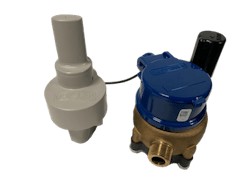Replacing Automatic Meter Reading (AMR) with Advanced Metering Infrastructure (AMI) System System
About the author:
Matt Zellers is territory manager for Mueller Systems. Zellers can be reached at [email protected].
Located in Wyoming, the City of Sheridan has a population of approximately 17,500 residents. Thwarted by aging meters installed almost 20 years ago, the city researched a smart meter system that would provide improved system reliability and future operational efficiencies. To achieve this goal, Sheridan migrated from its existing automatic meter reading (AMR) system to a more powerful and flexible advanced metering infrastructure (AMI) system.
“One of the many things we want to achieve is to serve as an efficient unit that is equipped with the ability to carry out meter reading instantaneously at any time of the day, and be able to identify leaks in the system”, said Ken Hirschman, utility maintenance superintendent for Sheridan. “We also wanted to upgrade to smart water meters that are less mechanical and with less moving parts – effectively enabling us to get rid of mechanical meters and not be stuck with a load of inventory and a meter rebuilding process.”
The city found the perfect solution in the Mueller Systems two-way Mi.Net AMI network system for its functionality and cost-effectiveness, amongst other attributes needed to meet its goals.
This system is a communication network that fully automates the meter reading to billing process by linking meters in a single, highly efficient data network. This provides the backbone for advanced metering technology as well as sensors for continuous monitoring of the entire water distribution system.
Advanced Metering Infrastructure (AMI) System Saves On Labor
The new AMI system has saved the City valuable labor hours, which are now deployed to other vital areas of their water and sewer systems. The city reports an average of 2,300 staff hours saved annually on meter reading, work orders and turn offs. The utility maintenance team also calculated approximately 65% of their time saved on meter related work, as they can now get instantaneous reads without having to roll a vehicle.
Over time, the city’s utility maintenance team transitioned its dedicated person for meter reading to an operational role where he can contribute to other parts of the water and sewer systems, not just meters. These additional staff hours allow the city to accomplish more important activities such as cleaning and flushing sewer mains saving Sheridan an estimated $50,000 per year on sewer backup claims. Additionally, the city replaced six fire hydrants that resulted in increased system reliability on hydrants that were previously non-functioning or had low flow.
“We are able to serve our city and community much better than before,” Hirschman said. “In a year, we saw our fire hydrant maintenance jump over 800 hours that we never were able to do. We had an extra 500 hours into sanitary sewer maintenance that was also unprecedented. Overall, our system maintenance has really improved. There have been less sewer plugs and claims against the city, and more time for replacing fire hydrants to safeguard our residents.”
The Mi.Net system integrates with Mueller Systems remote disconnect meter (420RDM), giving operators the ability to turn meters on or off with the system software in under 18 seconds, saving valuable labor hours.
On-Demand & Hourly AMI Readings
The Mi.Net radio transmitter captures a read from each meter every hour. Each night, the node uploads all the reading to the Mi.Net servers, and into the city’s user interface. Should utility staff need data urgently, a reading may be requested on-demand; the reading is sent to the meter and read in real-time, feeding back to the operator within seconds.
The AMI system has allowed the customer service team to remedy the issue that was formerly in the hands of another city division.
“If there are readings that did not pull through during the billing process, or if a customer suspects a leak in their service line, we do not automatically need to roll out a maintenance truck to investigate,” said Cathy Wright Bare, customer service specialist for the City of Sheridan. “We are able to immediately access the readings and usages before and after the date in question and help identify what is needed. With information available at daily and even hourly intervals, we can offer customers fully substantiated information to help them know with confidence how their home systems are functioning.”
It is estimated the customer service team has been saving approximately 800 hours per year making use of the new AMI capabilities and efficiencies. This allows the members of the team to reallocate resources to other customer service endeavors.
From a water conservation perspective, the ability to capture hourly and on-demand data allows issues such as unauthorized domestic water use and network leaks to be addressed in a timely manner. For Sheridan, a reduction in wholesale water cost and energy required for pumping during production and distribution can be realized. For customers, the self-service functionality empowers them to track their usage pattern, identify leaks, and maximize their household water consumption efficiency.
Redundancy & Back-up from Network Operations Center
All Mi.Net Systems are continuously monitored by network engineers in a Network Operations Center (NOC). The NOC employs software to analyze all communications and identify patterns, trends, and conditions allowing engineers to respond in real time and adjust remotely when required.
“The other great thing that we really liked about the Mi. Net system is the hosted option - they have the NOC which monitors our system as well as we do,” Hirschman said. “If there is any issue, and we do not have to have any extra personnel to manage that, NOC does it all. The team at Mueller Systems really demonstrates the willingness to be successful for this project and the community.”
Prioritization of AMI Network Security
Whilst designing a solution for this deployment, Mueller Systems wanted to not only focus on helping the city maximize its investment in an AMI system by providing a true two-way network that allows upgrades, but also one of the most important factors: network security.
From end to end, the AMI system provides multiple layers of security to prevent hacking, impersonation, and other network security threats. Security mechanisms and protocols are designed into the system to enable hosting of all software in a secure environment and providing round the clock monitoring.
Additionally, the Mi.Net system architecture employs LoRa based applications to establish a reliable and secure layer that can prevent accidental loss and/or interception of customer data. This provides accuracy, distance, bandwidth, throughput, and resistance to interference in the unlicensed ISM band between 902 and 928 MHz. The use of this radio frequency modulation offers high-power transmissions and long range while having lower battery usage.
Since deployment, Sheridan’s system has averaged a 99.6% read rate percentage.


